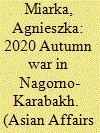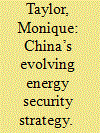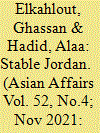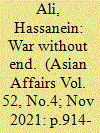|
|
|
Sort Order |
|
|
|
Items / Page
|
|
|
|
|
|
|
| Srl | Item |
| 1 |
ID:
183183


|
|
|
|
|
| Summary/Abstract |
The article aims to analyze the autumn war in the Nagorno-Karabakh region, which took place in 2020, and explain its impact on the strategic balance of power in the South Caucasus region. This issue is important for regional security and power projection in the South Caucasus. The author focused on 1) The characteristics of the course of the war; 2) The impact of the war on the politics of Armenia and Azerbaijan; 3) The impact of the war on the new division of the sphere of influence between Russia and Turkey. In the course of the research, research techniques and methods characteristic of political science and security science (neoclassical realism paradigm) were used, including critical analysis of the literature on the subject, analysis of policy makers' statements, secondary analysis, and interpretation of quantitative data.
|
|
|
|
|
|
|
|
|
|
|
|
|
|
|
|
| 2 |
ID:
183186


|
|
|
|
|
| Summary/Abstract |
This article explores the ways in which China's energy security strategy has evolved over the past fifteen years. Energy security had become an urgent policy priority for Beijing by the mid-2000s due to China's rapidly increasing oil import dependency set against the backdrop of oil scarcity and rising oil prices. Rather than rely on purely market-based means to secure oil supply, China pursued a state-led or neomercantilist approach. Initially, the most notable and distinctive element of its oil neomercantilism was the overseas acquisition of oil assets by China's national oil companies (NOCs) under broad strategic direction from Beijing. However, increasingly over the past decade China's energy security strategy, while remaining neomercantilist in orientation, exhibits greater reliance on the market. Reasons for this shifting emphasis include the changing geopolitics and geoeconomics of the global oil industry, which moved to oversupply following the US shale oil revolution, along with transformations within the Chinese state under the leadership of President Xi Jinping.
|
|
|
|
|
|
|
|
|
|
|
|
|
|
|
|
| 3 |
ID:
183182


|
|
|
|
|
| Summary/Abstract |
In April 2016, Crown Prince Mohammed bin Salman unveiled Saudi Vision 2030, and the accompanying National Transformation Programme. To mark the fifth anniversary of the launch of Saudi Vision 2030, the Kingdom's economic and diversification blueprint, Crown Prince Mohammed appeared on a popular Saudi talk show to discuss the progress of the Vision's National Transformation Programs and address the concerns of average citizens in relation to national development. Following the launch of the Vision, my 2017 paper Saudi Vision 2030: A Viable Response to Youth Aspirations and Concerns? documented young male perceptions of Vision 2030 including their expectations and aspirations for the future. This paper revisits the themes discussed in the earlier one and asks to what extent Vision 2030 has impacted Saudi youth mindsets and behaviour. What have been the significant transformations from the perspectives of Saudi youth of both genders, and are these transformations perceived as desirable, personally beneficial, and long lasting? It also documents that whilst there is widespread support for the Vision, there are concerns about the pace of change, as well as the perception that to date, there has been an over-emphasis on elite interests.
|
|
|
|
|
|
|
|
|
|
|
|
|
|
|
|
| 4 |
ID:
183188


|
|
|
|
|
| Summary/Abstract |
The United Nations embraced the doctrine of “Responsibility to Protect” (R2P) in 2005, which states that it is a shared responsibility of the international community to protect peoples from the atrocities of war crimes, crimes against humanity, ethnic cleansing, and genocide. Regarding Myanmar, the UN Human Rights Council claimed there were gross violations of human rights and international law in Myanmar's Rakhine state. Also, the UN Independent Fact-Finding Mission found evidence of genocide, crimes against humanity, and war crimes, and accordingly requested that the international community employ R2P to protect the Rohingya people. The UN High Commissioner for Human Rights acknowledged the clearance operation that occurred on 25 August 2017 at the hands of the Myanmar military regime was a “textbook example of ethnic cleansing”. In spite of this, the international community has taken no effective measures to protect the Rohingya community from what was an “entirely predictable” act of genocide. This paper is a qualitative investigation, a review of possible strategic reasons for why the international community has failed to protect the Rohingya. The paper relies on secondary scholarly literature, policy records, UN, government, and NGO reports, grey literature sources, and online materials. ASEAN's non-interference strategy, the OIC's dependency on diplomacy, the EU's priority for the hybrid democratic transition of Myanmar, the UN's political dialogue strategy, and the UN Security Council's structural weaknesses are obstacles to the international community preventing genocide in Myanmar. This study contributes to understanding the strategies of ASEAN, OIC, EU, UN, ICC, and the ICJ in relation to the Rohingya issue. It examines the chances of these organisations championing R2P, and also considers whether the Rohingya crisis is too intractable or difficult to resolve under current arrangements.
|
|
|
|
|
|
|
|
|
|
|
|
|
|
|
|
| 5 |
ID:
183184


|
|
|
|
|
| Summary/Abstract |
The Hashemite Kingdom of Jordan has recently experienced large-scale unrest on a scale not witnessed for several years. The country, long viewed as a beacon of stability in a deeply fragile region, now faces a growing risk that it could be destabilised. This article addresses multiple pillars of stability and drivers of instability in Jordan, including the impact of the Syrian crisis, large-scale displacement, resource scarcity, and chronic political, economic, and social difficulties. Whilst the regime has endured crisis and remained stable, increasing pressures in the past few years have led analysts to predict the onset of violence or deepening instability in Jordan.
|
|
|
|
|
|
|
|
|
|
|
|
|
|
|
|
| 6 |
ID:
183189


|
|
|
|
|
| Summary/Abstract |
The National Islamic Alliance (NIA) has evolved as a leading Shia Kuwaiti political group since the 1980s. The NIA participates in electoral politics and Kuwaiti cabinets. While its roots go back to Shia activists in Kuwait, some of whom were linked to Iraq's Islamic Da'wa Party in the end of the 1960s, it is a pragmatic and Kuwaiti nationalist group. The article argues that the NIA shifted from being an active opposition group in the 1990s to a pro-ruling family and government group in 2008. The NIA's transformation was partly a response to the rise of sectarian politics in Kuwait and the opposition's resentment of the NIA's mourning of Imad Mughniyeh, a Lebanese Hezbollah leader. The article includes first-hand and secondary resources, including interviews and the NIA's figures' public statements to unpack the NIA's foundation, structure and changing relationship with the ruling family as well as its political engagement and positions on the Kuwaiti protest movement (2011–2013).
|
|
|
|
|
|
|
|
|
|
|
|
|
|
|
|
| 7 |
ID:
183185


|
|
|
|
|
| Summary/Abstract |
The year 2020 marked a change in Kazakhstan's approach to Kazakh asylum seekers from China. For the first time, ethnic Kazakhs escaping China's security and ethnic policy apparatus in Xinjiang Uyghur Autonomous Region (XUAR; Xinjiang) were granted a right to a temporary stay in the country. The status was valid for one year only, yet it was a significant improvement as until 2020 similar cases were lost in Kazakh courts. This change was possible due to the international advocacy of local Kazakh human rights activists, the growing international recognition of the Xinjiang issue by the West, and the ambitions of Kassym-Jomart Tokayev, who has been developing his own style of the presidency with social issues as its centrepiece.
|
|
|
|
|
|
|
|
|
|
|
|
|
|
|
|
| 8 |
ID:
183187


|
|
|
|
|
| Summary/Abstract |
On March 26, 2021, the civil war in Yemen entered its seventh year. Despite the multiple attempts made by the United Nations and other regional and international parties to end this war and launch negotiations leading to a comprehensive political settlement, these attempts have not yielded any tangible results, and the war continues.
|
|
|
|
|
|
|
|
|
|
|
|
|
|
|
|
|
|
|
|
|